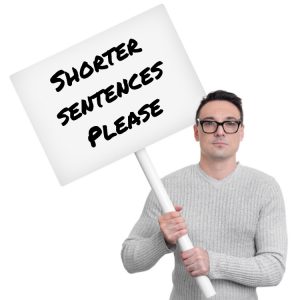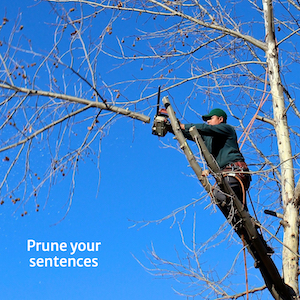
How many words do you look at each day? Think of all the text that you encounter: emails, Slack messages, news headlines, LinkedIn or Facebook posts, reports, books, articles, and more.
Research conducted in 2009 found that Americans saw or listened to an average of 100K words each day. I’d bet that the number is higher now in our remote world.
You couldn’t possibly read all of those words carefully. Your attention and focus is precious. Spend it wisely.
Now flip this situation. Instead of yourself, think of the people you hope to reach—your readers. They are just as inundated as you are, if not more so.
If you want people to pay attention to your ideas, make them as easy to understand as possible. Reduce the mental effort.
While there are many ways to simplify and clarify your writing, there’s one piece of advice that most of us need.
Shorten your sentences
If you want your words or ideas to penetrate, eliminate unnecessary packaging in your sentences. This advice applies to nearly everything you write: email, Twitter posts, team reports, blog posts—even books.
You may need to unlearn writing practices you adopted in college.
The most valuable college class I took was an introduction to journalism class in my senior year. It taught me how to write quickly and to cut to the essence. This advice counteracted years spent as an English Literature major, deconstructing the elaborate prose of earlier centuries and attempting virtuosic efforts myself.
After I left college, I had to relearn the way I wrote. And I continue to help my clients do the same.
I once worked with a Spanish tech entrepreneur who hired me to work on his corporate website and marketing collateral. The first thing I did was to take a metaphorical machete to the long, elaborate sentences on his website.
He pushed back, somewhat appalled by what I’d done. He said, “In Spain, long sentences are the sign of advanced education.”
I replied, “In the States, no one will read them.”
(He let me rewrite the website.)
There is a cultural component to this advice. But as everyone around the world is subject to the same information onslaught, we should show more consideration for our readers, no matter where they are.
This continues to be one of my most consistent bits of writing advice. I’m tempted to get “Shorter sentences!” printed on a t-shirt to wear on Zoom calls.
The case for shorter sentences
I’m not anti intellectual. You don’t have to shorten everything. Elegant sentences still have their place in the world.
But I also believe in being considerate of the reader. For most writers (myself included), readability improves when we shorten a few sentences here and there.
Think of it like pruning—how much you shorten the sentences depends on the situation and the effect you hope to achieve.

Are you writing for online reading (like a website or email)? Shorter sentences make it easier for people to scan the text and find what they need.
In longer works (reports, books), you have more of the reader’s attention. You can include more elaborate sentences. Even then, don’t overload them. Spare the reader’s mental effort and vary the tempo.
Need more reasons?
- Your long, beautiful sentences will shine when surrounded by shorter, simpler ones.
- If the reader must juggle complex clauses or backtrack to make sense of the sentence, they will get mentally tired. When that happens, they might start skimming or simply move on to something else.
- Grammatical errors often creep into those long sentences. (Noun/verb agreement is easier to mess up when intermediate clauses separate them.)
When to prune
Good news: this is an easy fix to apply in revision. Look through something you’ve written and apply the following guidelines:
- If you have three or more sentences in a row that are long and have multiple clauses, shorten one of them.
- Break up sentences that have many independent clauses, or where people might lose the train of the idea.
- Put your most important ideas in simple sentences. (Here’s a good test: Could someone tweet this?)